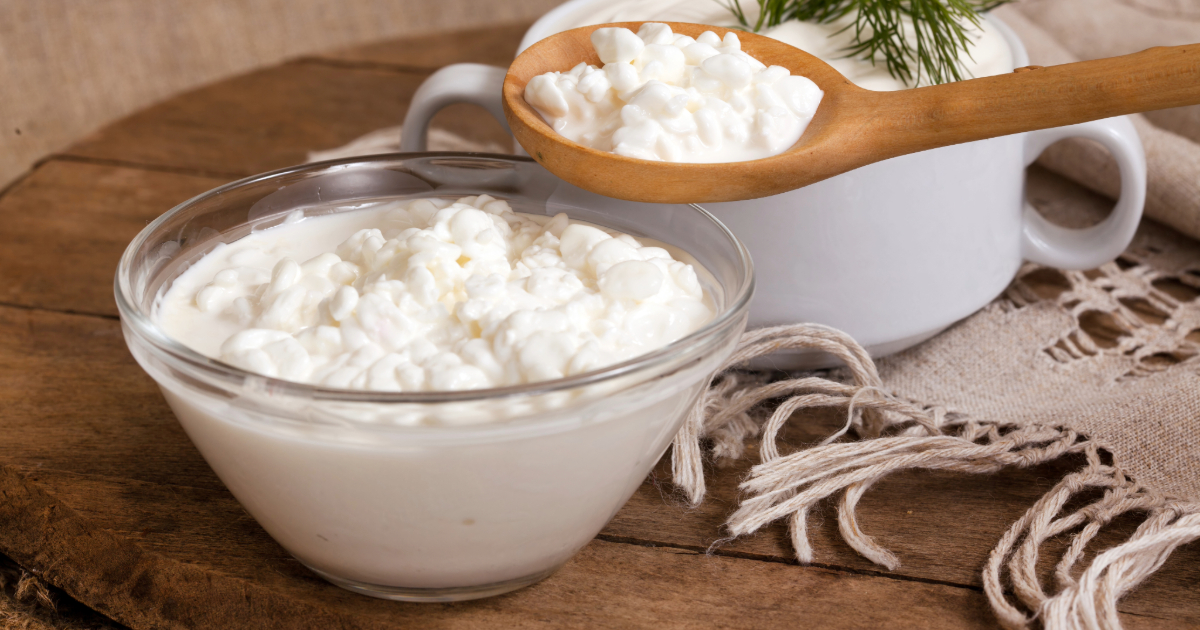When you're shopping in the dairy section trying to decide between cottage cheese or ricotta, it can get confusing.

These two ingredients may look somewhat similar, but they actually have many differences when it comes down to it.
What is Cottage Cheese?
Cottage cheese is a fresh, soft cheese made from the curds of cow's milk. To make cottage cheese, first the cow's milk is curdled by adding an acidic substance like vinegar or lemon juice.
This causes the milk solids (curds) to separate from the liquid whey. Next, the curds are drained and rinsed before being mixed with a bit of cream for a creamier consistency.
Cottage cheese has a mild, fresh taste that is a little tangy or sour from the cheesemaking process. It has a moist, crumbly texture with soft curds suspended in liquid (whey).
What is Ricotta Cheese?
Ricotta is also a soft, fresh cheese but it's made from the whey leftover during the production of other cheeses, like mozzarella.
To make ricotta, the whey is reheated, and then an acid like vinegar or lemon juice is mixed in. This causes the remaining proteins in the whey to coagulate and form curds, which are drained and processed into the smooth, creamy cheese we know as ricotta.
Unlike cottage cheese, ricotta has a very creamy texture, like a thick custard. Its taste is on the sweet side and much milder compared to other cheeses.
| Cottage Cheese | Ricotta |
|---|---|
| Made from: Cow's milk curds | Made from: Leftover whey from other cheeses |
| Texture: Moist, crumbly, curdy | Texture: Smooth and creamy |
| Taste: Mild, tangy, sour | Taste: Mild, slightly sweet |
Nutrition and Health Benefits
When looking at cottage cheese versus ricotta nutrition, there are some clear differences that are important depending on your dietary needs.
Calories and fat
Cottage cheese is lower in calories and fat than ricotta cheese. Per single serving, cottage cheese has around 100 calories and 4g fat compared to ricotta which provides roughly 175 calories and 15g fat per serving.
Protein
Cottage cheese really shines in the protein department, packing a whopping 28g protein per serving. Ricotta contains less than half that amount at around 14g protein per serving.
Vitamins and minerals
While ricotta contains more calcium and vitamins A and E, cottage cheese provides higher amounts of B vitamins like riboflavin and vitamin B12. Both offer phosphorus, selenium, and vitamin D as well.
Including cottage cheese or ricotta as part of a balanced diet provides certain health advantages depending on which you choose:
- Cottage cheese is perfect if you want to build muscle or strength train thanks to all that protein. The high protein content also helps you feel full.
- Ricotta can improve bone health since it's high in calcium.
- The nutrients in cottage cheese help with metabolism and turning food into energy.
- Ricotta may support heart health as it's naturally low in sodium.
Cottage cheese and ricotta work well in both sweet and savory dishes depending on what texture and flavor you prefer.
Usage Of Ricotta and Cottage Cheese
Here are some of the most popular ways to use each one:
Cottage Cheese
Cottage cheese makes an excellent lower-calorie substitute for heavy cream or cheese in recipes like:
- Dips, spreads – Mix with fresh herbs like dill or chives.
- Salads – Toss with fruits, veggies, nuts, and dressing.
- Lasagna, casseroles, egg dishes – Use instead of ricotta for a curdy texture.
- Smoothies, shakes – Blends easily for extra protein and nutrients.
For sweet recipes, cottage cheese adds moisture, richness, and tang:
- Pancakes, waffles, muffins
- Cheesecakes
- Fruit salads
- Parfaits
Ricotta Cheese
Thanks to its velvety-smooth and mildly sweet flavor, ricotta shines in these dishes:
- Classic Italian recipes like lasagna, stuffed pasta shells, cannoli
- Cheesecake, tiramisu, ricotta pancakes
- Toppings for pizza, pasta, bruschetta
- Mixed into dips like spinach-artichoke
- Sweet ricotta tarts or chocolate ricotta cream
Key Takeaway: Cottage cheese adds protein plus tangy flavor and texture to dishes, while milder ricotta provides a smooth, creamy richness.
FAQs
Is ricotta healthier than cottage cheese?
While both have nutritional benefits, cottage cheese tends to be healthier overall since it's lower in fat and calories while providing more protein. However, ricotta has its advantages too being higher in calcium for bone health.
Can you replace ricotta with cottage cheese?
Yes, in most recipes you can substitute an equal amount of cottage cheese for ricotta and vice versa. The flavor and texture will be a little different but often still tasty. To make cottage cheese smoother, you can blend or process it first.
Which cheese is better for weight loss?
Evidence shows that high protein foods like cottage cheese provide a metabolic advantage when it comes to losing weight. The protein keeps you feeling fuller longer compared to fats or carbs. So for weight loss, cottage cheese may be the better choice.
Is cottage cheese good in desserts?
Definitely! The mild sweet flavor and creamy curds of cottage cheese pair nicely with fruits and sweets. Use it in pancakes, cheesecake, parfaits, and more for extra nutrition.
Is ricotta easy to digest?
Since it's made from whey which contains easily-digested proteins, ricotta does tend to be gentler on digestion compared to regular cheese. Many people who experience discomfort eating dairy find they can tolerate ricotta. Check with your doctor if you have concerns.
Conclusion
While ricotta and cottage cheese may seem interchangeable at first glance, a closer inspection reveals unique differences when it comes to their production method, nutrition profile, taste and texture.
Cottage cheese offers rich protein content plus a tangy flavor and curdy texture.
Mild and creamy ricotta excels at bringing smooth richness and body to Italian cuisine.

